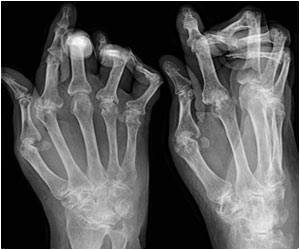A non-invasive treatment using an external device was found effective in improving disease severity of rheumatoid arthritis.

TOP INSIGHT
The non-invasive stimulation suppresses inflammation in rheumatoid arthritis patients.
In this pilot study, Sangeeta S. Chavan, PhD, Feinstein Institute professor, along with Meghan E. Addorisio, BS, tested the efficacy of non-invasive vagus nerve stimulation to reduce inflammation and improve disease severity in RA patients. They found that bioelectronic medicine treatment was effective in inhibiting the production of cytokines, proteins that mediate inflammation and reduce the inflammatory responses in patients with rheumatoid arthritis.
"Our primary objective was to observe if a non-invasive treatment using an external device will be effective in improving disease severity of rheumatoid arthritis that continues to plague more than one million across the country each year," Dr. Chavan said. "We are pleased to observe that this novel bioelectronic treatment significantly reduces swelling and inflammation associated with RA."
Source-Eurekalert
 MEDINDIA
MEDINDIA




 Email
Email










